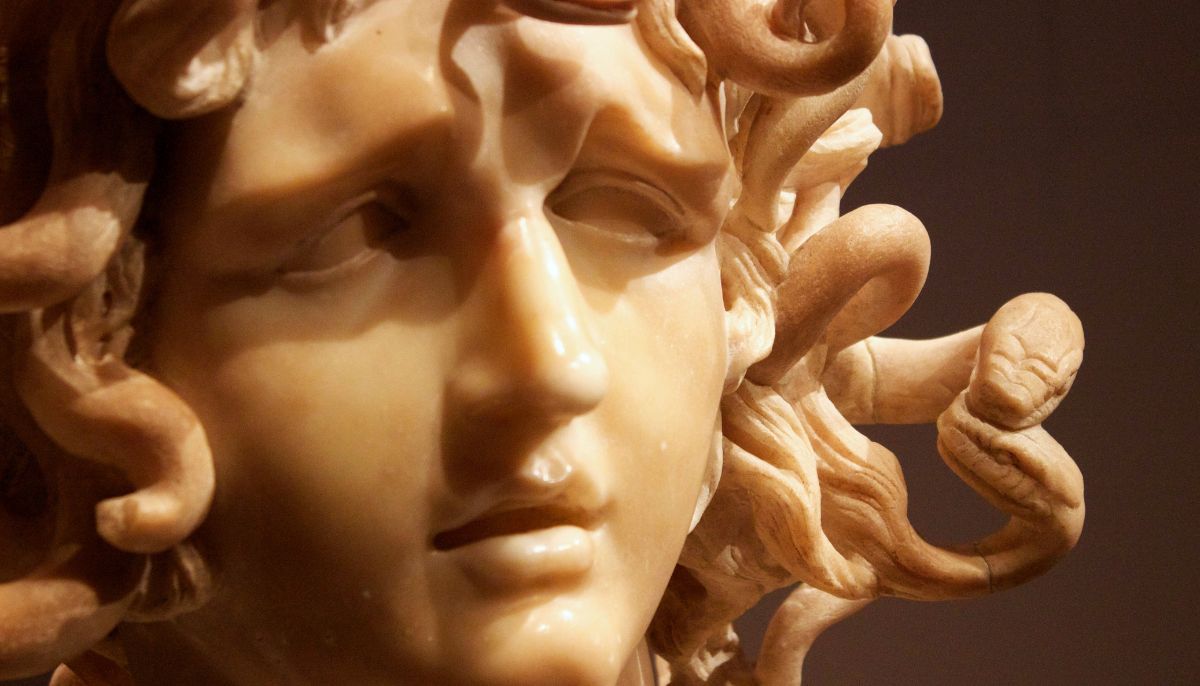In Greek mythology, Medusa was a beautiful maiden with luscious hair and striking features until she was cursed by the goddess Athena and turned into a hideous monster with snakes for hair.
But why did Athena curse Medusa?
In this article, we will delve into the myth of Athena and Medusa and explore the various theories behind Athena’s actions, questioning whether her curse was meant to punish Medusa or if other motivations were at play.
The myth of the curse of Medusa

The story of Medusa is an ancient Greek myth that has been passed down through the ages. It is believed to have originated in the pre-classical period, around 700 BC.
It was later popularized in the works of the poet Hesiod and the playwrights Aeschylus and Euripides. The myth has since been retold in countless forms, from art and literature to film and television. If you want to know about ancient Greek sources, check out the best Greek mythology sagas for adults.
Medusa Before She Was Cursed
Before Athena cursed her, Medusa was a beautiful woman known for her striking looks and charm. She had luscious, long hair that was the envy of many, and her features were said to be so alluring that even the gods themselves were captivated by her beauty.
In addition to her looks, Medusa was a priestess of the goddess Athena, the patron goddess of Athens and the embodiment of wisdom, courage, and strategic warfare.
The feud between Athena and Poseidon
At the time when Medusa was a priestess of Athena, the relationship between Athena and Poseidon, the god of the sea, was strained.
Both gods were powerful and influential figures in the Greek Pantheon, but Poseidon was considered the more powerful of the two.
The rape of Medusa by Poseidon
In some versions of the Medusa myth, it is said that Poseidon had courted Medusa for some time, but she rejected his advances. This rejection angered Poseidon, and he eventually raped Medusa in the temple of Athena, desecrating the sacred space with his violent act.
It is important to note that in some interpretations of the story, Medusa’s vow of celibacy was part of her role as a priestess of Athena, and her rejection of Poseidon’s advances was not only personal but sacred.
The Curse of Medusa

Athena’s curse on Medusa was a powerful and devastating one. As punishment for Poseidon’s violation of her temple, Athena transformed Medusa’s beautiful face into a grotesque mask of snakes. She made her so hideous that anyone looking at her would be turned to stone.
Medusa’s transformation into a monster affected her physical appearance and isolated her from the rest of society. She could not interact with people without causing them harm, and the fear and disgust she elicited made her an outcast.
In some versions of the story, she was banished to a remote island where she lived alone, shunned by all who knew of her curse.
In certain renditions of the myth, her newfound abilities serve as a form of self-defense. Her gaze transforms into a potent weapon, petrifying those who threaten her or others.
Why did Athena curse Medusa?

One of the myth’s most debated aspects is why Athena cursed Medusa.
Some interpretations suggest that Athena was punishing Medusa for her role in desecrating her temple.
In contrast, others argue that Athena was actually trying to protect Medusa from further harm.
Was Athena punishing Medusa?
The traditional interpretation of Athena cursing Medusa paints Athena as a punitive deity, acting out of fury when Poseidon defiled her temple.
According to this view, Medusa becomes the scapegoat for Poseidon’s actions, and Athena’s curse serves as a stark warning to anyone who might desecrate her sacred space in the future.
Those who support this interpretation highlight Athena’s well-documented traits of sternness and authority, arguing that her curse on Medusa is a logical extension of her no-nonsense attitude toward maintaining the sanctity of her temple.
However, many critics argue that this perspective oversimplifies the myth’s multifaceted narrative and ignores the possible complexities in the Athena-Medusa relationship.
They point out that myths often carry multiple meanings and that reducing Athena’s actions to mere retribution could be a limited way to understand her character or the wider themes of the myth.
Was Athena protecting Medusa?
Another compelling interpretation posits that Athena’s actions toward Medusa were not punitive but protective. According to this view, Athena, empathetic and just, saw the injustice meted out to Medusa by Poseidon and took steps to shield her from further victimization.
Athena’s curse can be seen as an unorthodox method of safeguarding Medusa from additional harm. By transforming her into a fearsome creature—with snakes for hair and the ability to petrify onlookers—Athena effectively insulated Medusa from future mistreatment, making it impossible for any man to approach her again.
In this interpretation, Athena’s actions serve as a counter-narrative to the idea of her as a vindictive goddess. Instead, she becomes a deity using her powers to navigate the complex social taboos of her time, creating a protective barrier around Medusa, albeit in a way that also isolates her.
The protection of Medusa
The use of Medusa’s image in ancient Greece as a protective emblem for women’s sanctuaries supports the notion that her transformation was more safeguard than punishment.
Her fearsome image served as a potent deterrent against male aggression, suggesting a more complex narrative around Athena’s motives.
While the prevailing view may cast Athena’s actions as punitive, the protective interpretation adds intricate layers to the Medusa myth. It invites us to reconsider Athena not just as an authoritative deity, but also as a nuanced protector of society’s vulnerable.
Therefore, Athena’s curse could be a misunderstood act of mercy, offering us a richer, more compassionate lens through which to examine this enduring myth.






